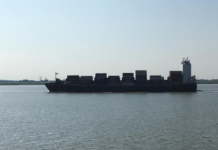
Dimitar Pavlov, head of business development of Transmetrics, a logistics technology provider specialising in container management automation & optimization, has shared his views with Container News on the digitalization process of the shipping industry.
Dimitar Pavlov explains what technology developments we should expect in the near future, analyzes the supportive role of Artificial Intelligence in the shipping industry and comments on the new possible challenges.
- What is the next step in the digitalization of the shipping and logistics industry?
Digitalization used to be a nice-to-have thing but nowadays, being technologically advanced results in increased efficiency and customer satisfaction consequently creating a competitive advantage. Although these are less important in the limited capacity and sky-high rates environment, we can see more and more companies thinking beyond this finite honeymoon period. Such organizations already invest heavily in changing their legacy systems, building data lakes, system integrations, etc. allowing seamless data flow, streamlined data generation, and quality.
As recently as last month we saw that Hapag-Lloyd is equipping its entire fleet with IoT devices and other carriers will surely follow suit. This will create an explosion of the generated data volumes and will open an entirely new field for further Big Data & Predictive analytics applications. I see the efforts to extract valuable insights from the vast amounts of data, including building various automation, optimization, and forecasting applications, on top of it, as the next big thing in the shipping industry digitalisation roadmap.
- Could Artificial Intelligence assist in severe problems of the shipping industry, such as port congestions and container shortages, and how?
The main word here is “assist” as it well portrays what the role of AI in the shipping industry should be. I believe in the notion of Augmented Intelligence where the fusion between humans and AI takes the best of both worlds. Artificial Intelligence could be very beneficial for improving supply chains, by providing future insights, running what-if scenarios simulations, and optimizing network flows. AI can help to avoid port congestions by predicting such and prescribing mitigation measures weeks in advance. AI could also be particularly beneficial for preventing container shortages by predicting full container demand, as well as empty pickups and returns, determining the optimal stock levels, and suggesting the most efficient repositioning plan weeks in advance. There are huge interdependencies – a small event on one side of the globe could lead to a significant change on another and smart algorithms are best equipped to tackle this complexity. We let the machines do the number crunching so the planners can foresee and tackle these disruptions.
- Do you believe that shipping stakeholders are still reluctant to new technologies and digital systems?
Fortunately, the shipping industry is getting more receptive to digital transformation. You can see that in the speed with which they update their technological landscape and the value they start to see in their data. The level of collaboration & standardization fostered by the work of DCSA and other industry bodies, the wider adoption of electronic bills of ladings, etc. are also good examples. The other positive trend is that many of the big players realize that they cannot do it all themselves and are increasingly open to working with startups and other third parties to tackle the industry’s pain points. Many of them are already participating in acceleration and incubation programs, have active VC arms, etc. Standardization and evolution of third parties are also benefiting the mid-sized and smaller companies as it helps to create solutions that they were previously unable to benefit from.
- There is the fear that new technology innovations, such as automated unmanned port vehicles and container scanning devices, will gradually replace humans. What is your opinion?
Due to the current high demand, the whole industry is suffering from a lack of talent. In this regard, having technologies that lead to enhancing humans’ capabilities and improving their efficiency should be very welcomed. Automating repetitive and straightforward tasks is not really a threat as it allows humans to use their creativity by focusing on exception rather than event management. However, I personally do not believe in full automation and, just like during the industrial revolution, I see the advantages of wider technological adoption to significantly outpace its drawbacks.





